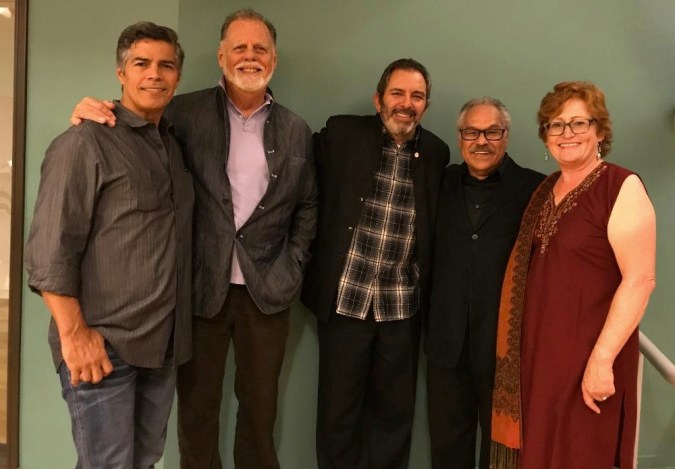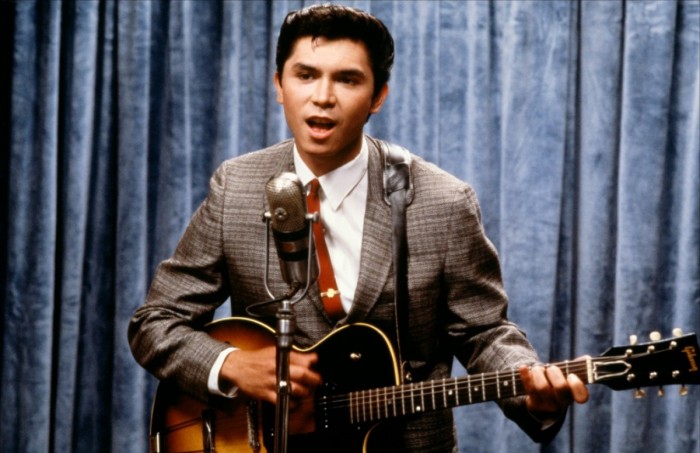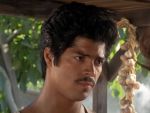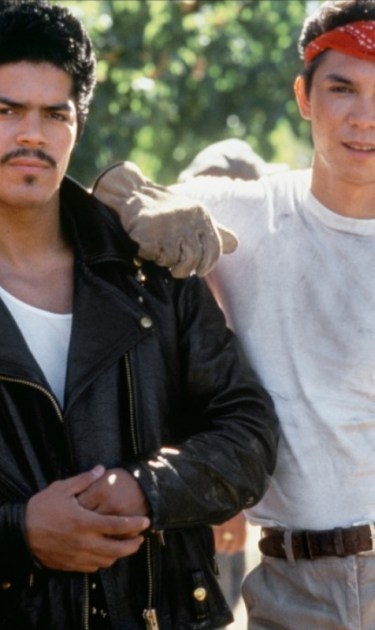It’s a big year for Chicano pioneer Luis Valdez, whose work is finally getting the recognition it deserves from the Academy of Motion Pictures Arts and Sciences. He is the only director with two films screened as part of the From Latin America to Hollywood series in Los Angeles and one of the few representing US Latino talent. First came Zoot Suit, followed by a conversation with Edward James Olmos and other cast members, and more recently a 30th anniversary presentation of his musical landmark, La Bamba, at LA Plaza de la Cultura y Artes. The screening for la raza included musical acts, a Q&A with Valdez, actor Esai Morales, and producer Taylor Hackford among other key people in the production. Luis Valdez can also be heard in Pixar’s Coco voicing Tio Berto, one of Miguel’s uncles.
Released in 1987, La Bamba was a quintessential Hollywood film from a Latino point of view starring Lou Diamond Phillips as Ritchie Valens, the young Mexican-American star that bewitched audiences throughout the 50s until his tragic and untimely death in 1959. Glossy musical numbers reminiscent of other movies set in that time such as Grease and top-notch production design, transported viewers to a bygone era. Certainly, the songs performed by East LA natives, Los Lobos, are also part of what has helped the film stand the test of time. La Bamba earned a Golden Globe nomination for Best Motion Picture –Drama in 1988.
Valdez has more than una poca de gracia, and during the conversation preceding the screening, he share anecdotes about his decision to cast a half-Filipino actor in the lead role of a Chicano story and how rock ‘n’ roll exemplifies American multiculturalism. Here are some highlights from the event.
Luis Valdez on How a Mariachi Group in New York Inspired La Bamba
My brother Daniel and I – who played Lelo in this film and who was also an Associate Producer, played Henry Layna in Zoot Suit – were on Broadway. We were in his dressing room on opening night [of Zoot Suit], up on the second story, and we were feeling pretty big and full of ourselves, so we said, we’ve done the ‘40s, we’ve got to do the ‘50s, but what can we do about the 50s as a musical in New York? At that moment, we heard mariachi music, and we looked out the window, and down below on Seventh St., in the heart of New York, there was a band of mariachis, and they were playing a song that my brother and I instantly recognized: “La Bamba.” The answer to what we were going to do next was “La Bamba” playing down in the street. The mariachis had been sent by the President of Mexico, Echeverria. We didn’t know it at the time, but Mexico was sending it’s good wishes, because it was the opening of the first Chicano play on Broadway.

Taylor Hackford on Los Lobos Coming on Board
The thing is, Los Lobos came from East Los, and they had already recorded a song of Richie’s. We all agreed, there was no question about the fact that we could use Richie’s original tracks, but when you’re trying to do something live it’s hard, because you only have what’s on the records. Those records were great hits but they weren’t so beautifully recorded, but we had the real thing. We had a Chicano group from East Los, who are brilliant. All the guys in Los Lobos are great friends. I called all the guys in the group, and I went to see them out here. They were playing in Lincoln Park, and I went to see them backstage, and I said, “Listen, we’re doing this film, and I really think you need to do this music.” And they looked at each other and said, “Yes, we have to.” That was it. So they were fantastic, and they recorded. It was amazing, because when we recorded this, in one instance when we did the opening song, which was a Willie Dixon song, Willie Dixon played it with them. If you don’t know who he was, he was the guy at Chess Records, one of the great Bass players and producers ever. Carlos Santana was also there, so in a sense, Carlos Santana did the score to our movie and Los Lobos did Richie’s music, so this is puro Chicano all the way down.
Esai Morales on What La Bamba Represents for Latinos
I owe a lot to this film. Like you, I cried tears reading this story, falling in love with this family, reading a script about a Latino family that wasn’t about being Latino. It was just about being Americans with a dream, loving rock ‘n’ roll and each other. It wasn’t pedantic. It wasn’t talking down to people, or making us better than we were. We had our problems, and I represented most of them, my character. I loved seeing all the well-defined characters.

Luis Valdez on Ricardo Valenzuela Becoming Ritchie Valens
In 1958, there were no Latinos in rock ‘n’ roll. There were barely black people, and they invented rock ‘n’ roll. A lot of black artists were covered by white artists like Pat Boone and other people, because black and white had not completely reconciled their places in the music world yet. But someone like Ritchie, who was Latino, he wouldn’t stand a chance if he looked like my brother Danny, he’s too indigenous looking, never would have made it in reality. In the movies, it’s something else, but not in reality. I was looking for someone who looked like the real Ritchie, 6 feet tall, with very light skin like his mother, but deep Indian bones, a big kid. We have light-skinned Chicanos, güeros, all over the place, he was one of them, but that helped him pass as Italian I think. Once his agent changed his name from Ricardo Valenzuela to Ritchie Valens, he turned Italian. When I first heard La Bamba when it appeared in 1959, I said, who’s singing in Spanish? Who’s this guy Ritchie Valens, he’s an Italian singing in Spanish. It wasn’t until later that I discovered that it was Ricardo Valenzuela, and that he was singing of course a Mexican classic, “La Bamba.”

Esai Morales on the Latin Wave That Didn’t Happen
We thought it would be the Latin Wave, they kept talking about the Latin Wave, but waves come and they go. They try and reproduce it, try to make, Lambada, and things that sound similar so it could be next to it on the video shelf, but nobody to this date has put together what these two gentlemen put together, because it was a real collaboration. The authenticity of the Latino experience by a real revolutionary artist, Mr Luis Valdez, who was side by side with Cesar Chavez and Dolores Huerta, in so many of the struggles. We didn’t have a Hollywood writer. We had the real deal. But also, the commercial genius of Taylor Hackford, who cut this movie – the first cut was about three hours and 10 minutes long – and kept the life and story of this film in a way that could still be impactful, but short enough so that the studios wouldn’t cringe and could still make their collaboration. It was a collaboration and it wasn’t easy, but it was well worth it. I thank them, because to this day my career benefits from this movie, and I’m very proud of it.

Luis Valdez on Why Lou Diamond Phillips Was Perfect to Play Ritchie Valens
It was hard to find the real soft heart, the good heart of Ritchie, and Lou Diamond Phillips has that in spades. He had nothing but Christian films in Texas, and he was naïve in a lot of ways, but tremendously talented and all heart. We cast him despite the fact that some people complained that he wasn’t Chicano, or that he was half-Filipino. I had people come up and say, “Por que metiste este Filipino” and I said, “Why not? The Filipinos are the Hispanics of Asia, what’s the problem?” In any case, Ritchie was who he was, and Lou Diamond Phillips is the child of a Filipino mother and an American sailor father, so he was very tall, and thinner than Richie would have been, but he had the heart quality, and that was the most important thing. We cast him as Richie, combined him with Esai as Bob, and the rest is film history.
Luis on Rock ‘n’ Roll Keeping America Honest
The story of Richie Valens is a story of rock ‘n’ roll. It’s a story of multi-cultural and multi-racial America; at a time when America had it’s highest hopes, in the 1950s that it was going to be an example to the rest of the world. That is our challenge today, in a time when people’s ethnicity is being questioned, when their race is being condemned, we must continue to sing the song of rock ‘n’ roll to keep this country honest and real.





